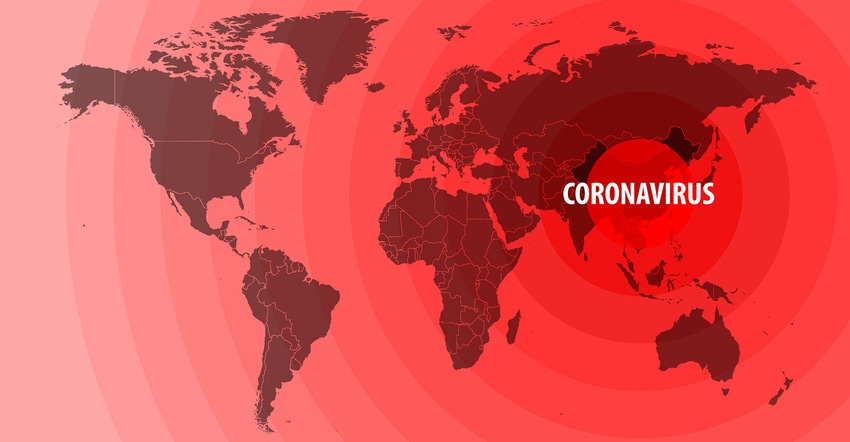Stay calm, be aware and for God's sake, wash your hands.

Is the sky really falling, Chicken Little?
COVID-19 has become deeply embedded into Americans' minds, and has consumed much of our attention, and has begun to alter our lives.
Though it's minimal in the greater scheme of things that really matter, we have seen many athletic endeavors postponed or outright canceled. The normal March Madness of the college men's and women's basketball tournaments has been replaced by another March Madness as the tournaments have been canceled to reduce chance of viral exposure to players, coaches and fans. Professional basketball and hockey seasons have halted immediately, with no timetable announced if they will resume their seasons.
Baseball spring training has been interrupted, and the first pitch of the regular season has been pushed back at least a couple weeks to wait and see how things shakeout. High school leagues across the country are either modifying or outright canceling state tournaments for winter sports, and, for now, the spring season sports are in limbo.
U.S. colleges have also extended spring breaks or converted to online learning, or both, to prevent or eliminate potential risk.
Athletics, both professional and amateur, are a big part of the American fabric, but the country's bread and butter — agriculture — is also being impacted by COVID-19. Coronaviruses are nothing new for hog producers, but this one is different: It infects humans. For the same reason the National Collegiate Athletic Association has canceled it post-season tournaments, some agriculture organizations have opted to cancel or postpone their events or meetings. As an example, Four Star Veterinary Service has postponed its Pork Industry Conference from the originally scheduled March 31 to now take place July 21. Same great lineup, just a new date when hopefully COVID-19 is just a mere bad memory.
As of now, World Pork Expo will go on as planned early June in Des Moines, Iowa. How cruel would it be if World Pork Expo were once again canceled? Last year's expo was canceled due to risk of African swine fever, a virus that infects pigs, but does no harm to humans.
So, what are we to do in the here-and-now of COVID-19?
Is the virus and its reach being overblown by the media? Not if you or a loved one has become infected, and not if your immune system is compromised, making you more susceptible to harsher consequences of the virus.
For the rest of us, find out all you can about the virus before you are overcome with fear to leave your front door. The Centers for Disease Control and Prevention has oodles of information at your fingertips so you don't have to rely on being spoon fed information.
According to the CDC, for most people, the immediate risk of becoming seriously ill from the virus that causes COVID-19 is thought to be low. Older adults and people of any age with underlying health conditions, such as diabetes, lung disease or heart disease, are at greater risk of severe illness.
The CDC goes on to say we can all help control the spread of COVID-19 if we just know what to look for. The signs and symptoms of COVID-19 are fever, cough and shortness of breath. Those symptoms can be hard to differentiate COVID-19 from other respiratory ailments, so it is recommended to seek medical advice if you develop these symptoms and if "you have been in close contact with a person known to have COVID-19 or live in or have recently traveled from an area with ongoing spread of COVID-19."
It is important to call your doctor's office or emergency room prior to seeking care, so they may make accommodations to properly care for you and the other patients who may be present at the medical care facilities. When you call your medical provider, inform them of your symptoms and recent travel to help them determine if it is likely that you do indeed have COVID-19 rather than a common cold or seasonal flu. No need to make a bad situation worse by unintentionally infecting others.
OK, so you don't currently have symptoms, and you want to keep it that way. What can you do?
According to the CDC, it seems rather simple to help keep yourself and others healthy.
Wash your hands often with soap and water for at least 20 seconds, especially after blowing your nose, coughing or sneezing; going to the bathroom; and before eating or preparing food.
Avoid touching your eyes, nose and mouth with unwashed hands.
Stay home when you are sick.
Cover your cough or sneeze with a tissue, then throw the tissue in the trash.
It has also been recommended to avoid large assemblies, thus the cancelation and postponement of sporting events and concerts. I also heard a medical professional suggest avoiding air travel, unless it is a necessity.
Am I going to curl up in a fetal position and not leave my house? No. But neither am I going to seek out risky situations. Stay calm, be aware and for God's sake, wash your hands.
About the Author(s)
You May Also Like



